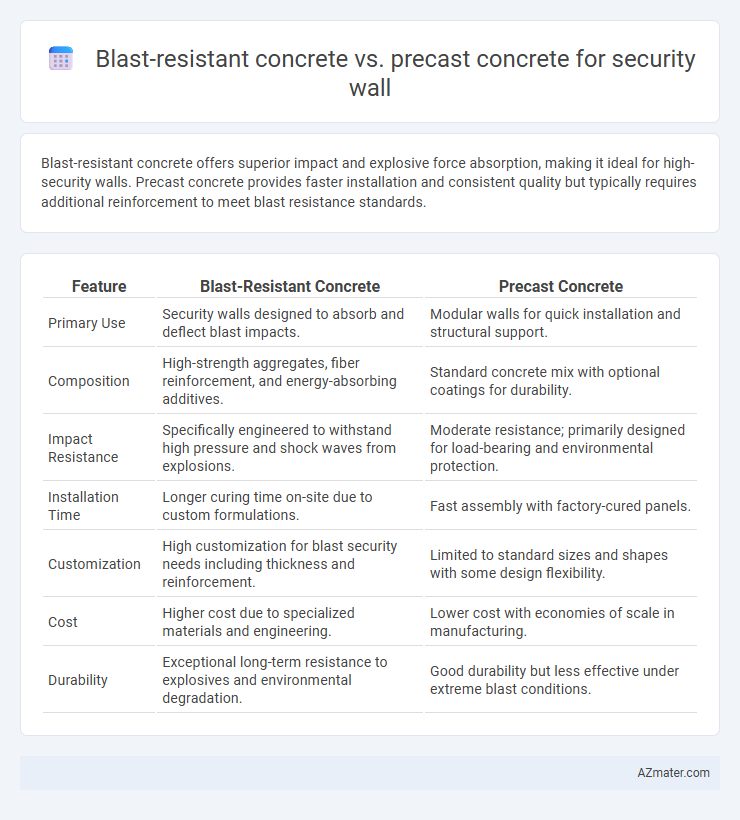Blast-resistant concrete offers superior impact and explosive force absorption, making it ideal for high-security walls. Precast concrete provides faster installation and consistent quality but typically requires additional reinforcement to meet blast resistance standards.
Table of Comparison
| Feature | Blast-Resistant Concrete | Precast Concrete |
|---|---|---|
| Primary Use | Security walls designed to absorb and deflect blast impacts. | Modular walls for quick installation and structural support. |
| Composition | High-strength aggregates, fiber reinforcement, and energy-absorbing additives. | Standard concrete mix with optional coatings for durability. |
| Impact Resistance | Specifically engineered to withstand high pressure and shock waves from explosions. | Moderate resistance; primarily designed for load-bearing and environmental protection. |
| Installation Time | Longer curing time on-site due to custom formulations. | Fast assembly with factory-cured panels. |
| Customization | High customization for blast security needs including thickness and reinforcement. | Limited to standard sizes and shapes with some design flexibility. |
| Cost | Higher cost due to specialized materials and engineering. | Lower cost with economies of scale in manufacturing. |
| Durability | Exceptional long-term resistance to explosives and environmental degradation. | Good durability but less effective under extreme blast conditions. |
Introduction to Security Wall Solutions
Blast-resistant concrete offers enhanced protection by absorbing and dissipating explosive energy, making it ideal for high-threat security walls. Precast concrete provides rapid installation and consistent quality with modular units that can be engineered for specific security requirements. Combining these materials allows for customizable security wall solutions balancing strength, durability, and deployment efficiency.
Understanding Blast-resistant Concrete
Blast-resistant concrete for security walls is engineered to absorb and dissipate explosive energy through enhanced strength and ductility, utilizing specialized aggregate blends and fiber reinforcements. It outperforms precast concrete by maintaining structural integrity under high-pressure shock waves, reducing fragmentation and preventing penetration. The design incorporates increased density and elasticity to withstand blast overpressures, making it a critical component in protective barrier systems for military and high-security infrastructure.
Overview of Precast Concrete Walls
Precast concrete walls offer enhanced durability and rapid installation, making them an effective solution for security barriers. Manufactured under controlled conditions, these walls provide consistent quality and superior strength compared to cast-in-place options. Their modular design allows for scalable protection against forced entry and blast impacts, providing a reliable defense in high-security environments.
Key Differences: Blast-resistant vs Precast Concrete
Blast-resistant concrete is engineered with enhanced density and toughness to absorb and dissipate explosive energy, featuring additives like fibers and polymers for improved impact resistance. Precast concrete walls are factory-produced, allowing for consistent quality and rapid installation but typically lack specialized reinforcement against blast pressures. The primary difference lies in blast-resistant concrete's superior structural integrity and ability to withstand high-impact forces, whereas precast concrete prioritizes efficiency and uniformity without inherent blast resistance.
Strength and Durability Comparison
Blast-resistant concrete offers superior strength and energy absorption capabilities compared to precast concrete, making it highly effective for security walls in high-risk areas. Its dense composition and reinforced fibers enable it to withstand explosive forces and prevent structural failure, while precast concrete, though durable and quick to install, may lack the same level of impact resistance. Over time, blast-resistant concrete demonstrates enhanced durability under extreme stress conditions, ensuring longer service life and improved protection against blasts.
Installation Process and Construction Time
Blast-resistant concrete requires specialized casting and curing protocols to enhance its strength and energy absorption, often involving reinforced steel and fiber additives, which can extend installation time due to on-site customization. Precast concrete for security walls is fabricated in controlled factory settings, allowing for rapid on-site assembly with minimal labor, significantly reducing overall construction time. The streamlined installation process of precast components enhances project efficiency while blast-resistant concrete provides tailored resilience but demands more intensive and time-consuming workmanship.
Cost Analysis: Initial and Long-term Investment
Blast-resistant concrete for security walls typically involves higher initial costs due to specialized materials and reinforced design requirements, ensuring enhanced protection against explosions. Precast concrete offers a cost-effective alternative with lower upfront expenses and quicker installation, but may require additional reinforcements to meet blast resistance standards, potentially increasing long-term maintenance and upgrade costs. Evaluating total investment should weigh initial expenditure against durability, maintenance frequency, and compliance with security specifications for optimal budget allocation.
Maintenance and Lifespan Considerations
Blast-resistant concrete offers superior durability and requires minimal maintenance due to its enhanced density and reinforcement, effectively resisting impact damage over extended periods. Precast concrete provides consistent quality with faster installation times but may need more frequent inspections and repairs at joints or connections to maintain structural integrity. Considering lifespan, blast-resistant concrete typically outperforms precast panels in high-threat environments, ensuring longer service life with reduced maintenance costs.
Application Scenarios for Security Needs
Blast-resistant concrete is primarily used in high-risk security environments such as military bases, embassies, and critical infrastructure facilities where protection against explosions and shockwaves is paramount. Precast concrete security walls are ideal for rapid deployment in urban perimeters, commercial properties, and temporary event security due to their modularity and ease of installation. Both materials serve security needs effectively, but blast-resistant concrete excels in scenarios demanding enhanced structural integrity against explosive forces, while precast concrete offers flexibility and speed in less extreme threat conditions.
Choosing the Right Concrete Solution for Your Security Wall
Blast-resistant concrete offers superior energy absorption and fragmentation control, making it ideal for high-threat security walls where explosive impacts are a primary concern. Precast concrete provides consistent quality and faster installation, suitable for projects requiring rapid deployment and modular adaptability without compromising structural integrity. Selecting the right concrete solution depends on balancing threat level, installation speed, and long-term durability tailored to the specific security needs of the site.

Infographic: Blast-resistant concrete vs Precast concrete for Security wall
 azmater.com
azmater.com